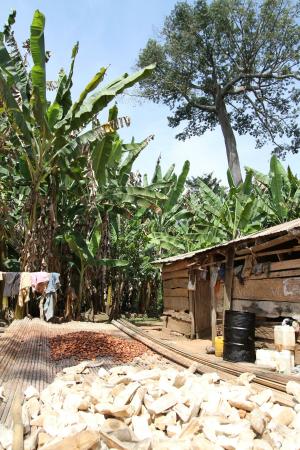
A Penn State researcher has been chosen to receive a grant through the Grand Challenges Explorations program, an initiative funded by the Bill & Melinda Gates Foundation. David Hughes, assistant professor of entomology and biology, will pursue an innovative global health and development research project, titled "Taking Out the Bodyguards: A Novel Solution to Ag Disease."
Grand Challenges Explorations (GCE) funds individuals worldwide to explore ideas that can break the mold in how we solve persistent global health and development challenges. Hughes' project is one of 107 Grand Challenges Explorations Round 8 grants announced today (May 9) by the Bill & Melinda Gates Foundation.
"Grand Challenges Explorations encourages individuals worldwide to expand the pipeline of ideas where creative, unorthodox thinking is most urgently needed," said Chris Wilson, director of Global Health Discovery and Translational Sciences at the Bill & Melinda Gates Foundation. "We're excited to provide additional funding for select grantees so that they can continue to advance their idea towards global impact."
To receive funding, Hughes and other Grand Challenges Explorations Round 8 winners demonstrated in a two-page, online application a bold idea in one of five critical global heath and development topic areas that included agriculture development, immunization and nutrition. Applications for the current open round, Grand Challenges Explorations Round 9, will be accepted through May 15.

Subsistence farmers face continual threats of pathogen spill over that affect yields. Driving this spill over are industrious yet pernicious ants that tend viral injecting bugs (flattened bodies under ants) and act as bodyguards preventing effective control. Credit: David Hughes, Penn State University
Hughes' project aims to reduce the incidence of plant diseases -- and consequently crop losses -- by reducing the population of ants that act as protectors for various crop pests. His research team would accomplish this by modifying plants to express genetic material that would pass through the plant feeders and be ingested by ants, effectively sterilizing ant queens and causing a rapid breakdown of ant colonies.
"Insects such as aphids, whiteflies and mealybugs spread viral, bacterial and fungal plant diseases that can lead to significant crop losses," Hughes said. "When feeding, they excrete a sugary substance known as honeydew, which ants then use to feed themselves, the queen and her offspring.
"In return, ants provide a protective service to the plant-suckers, permanently guarding them and even building tents of soil or plant material over them so they can remain unmolested by predators, parasitic wasps or insecticides."
By reducing the number of ants, Hughes explained, the plant-feeding insects would become more exposed to pesticide treatments or would succumb quickly to natural enemies already in the environment. He noted that ants' relatively long generation time makes the evolution of resistance less likely, adding that this approach would target only local ant-colony control without impact on the ant ecosystem as a whole.
As its model, the team will use cassava, which provides the bulk of calorie intake for more than 250 million people in Africa. "Mealybug and whitefly are major pests of cassava and lead to substantial crops losses," Hughes said. "The whitefly transmits cassava mosaic disease virus, which can wipe out entire yields."
Hughes said researchers hope the knowledge gained through this upstream research could lead to more environmentally friendly options for a variety of agricultural pest-management situations. "We believe this concept has transformative potential and could have a major impact on solving some of the world's most important issues, such as food production and agricultural productivity, in a relatively short period of time."
Hughes, who holds a joint appointment in the College of Agricultural Sciences and the Eberly College of Science, is an affiliate of Penn State's Center for Infectious Disease Dynamics and the Huck Institutes of the Life Sciences.
He will work with an international team of researchers that includes Mark Guiltinan, Siela Maximova, Cristina Rosa and Gary Thompson, Penn State; Wilhelm Gruissem, Swiss Federal Institute of Technology Zurich (ETH Zurich); Harry Evans, Centre for Agricultural Bioscience International (CABI); and Tony Cudjoe, the Cocoa Research Institute of Ghana.
About Grand Challenges Explorations
Launched in 2008, Grand Challenges Explorations is a $100 million initiative funded by the Bill & Melinda Gates Foundation. More than 600 people in 45 countries have received Grand Challenges Explorations grants. The grant program is open to anyone from any discipline and from any organization. The initiative uses an agile, accelerated grant-making process with short, two-page online applications and no preliminary data required. Initial grants of $100,000 are awarded two times a year. Successful projects have the opportunity to receive a follow-on grant of up to $1 million.